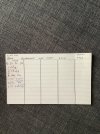Captain Flack
Registered
I have 3 steam engines, two in boats and 1 in Roundhouse. Is it advisable to keep a record of steaming time, and if so how do you do it? On paper or computer?
Thank you.
Thank you.

As you say Tac, but some of us are keeping record junkies so the recording is in part as much fun as the running. I just wish that I had had the anal record keeping that I have now, particularly when I look back at my 50’s amd 60’s Train Spotting books that are just a load of numbers with very few dates and locations recorded.I really can't be ars- bothered. All my steamers get looked at before, during and after a run, and to be honest, life is just too short to run a 'spread sheet' about a toy train. The only records I keep about the other main pastime that is meant to be fun, and not a chore, is my reloading data for my shooting. The very nature of the game demands that records be kept, especially after effectively losing access to four of the US-made propellant powder brands I used to use simply because the EU decided that they were somehow injurious to health. I had to change twelve loads in six different calibres to stuff that was available here in Europe, and that took a lot of paperwork and load development - AND funds.
I just wish that I had had the anal record keeping that I have now
Back to paperworkReally, or are you just going through the motions.
David
For me as my live steam have rechargeable NiCads packs, my records of runs helps to see if they are likely to need a top up before a run. Tye sad thing is it also shiws how little I use my Live Steam some getting a run perhaps only once in 3 years, the best being 2-3 times at most.I’ve just come across this thread and I would like to add my two penny worth.
At the moment I have eight live steam locomotives that can be run on the CFR. I keep no running records for these locomotives, but I do keep records of boiler testing etc. Each locomotive gets a thorough examination whilst it is being prepared for steaming. After a running session the locomotives are examined again before they are put away. Any faults are rectified there and then.
